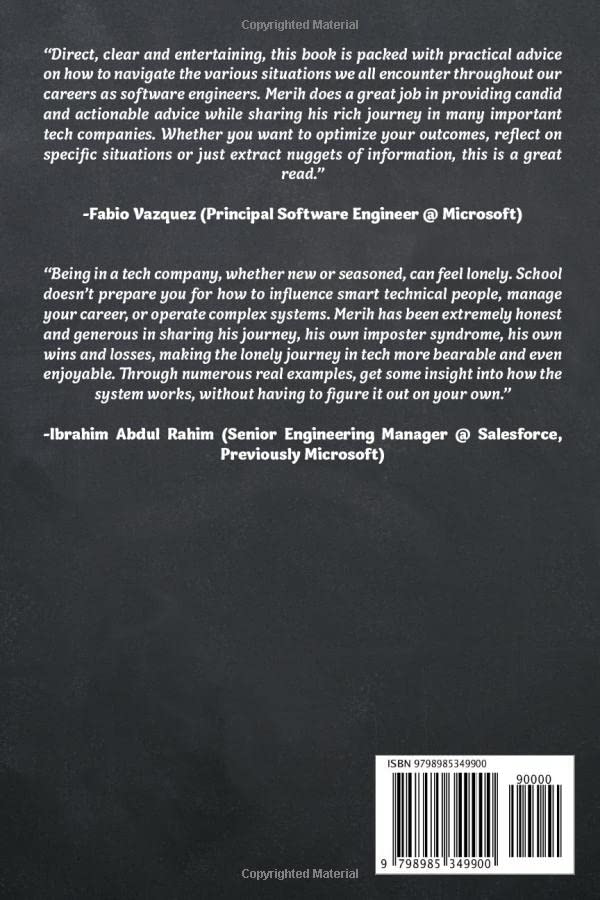


Full description not available
N**A
Dive into life of a software engineer, and conquer the modern corporate world
A great book, which was a breeze to read. It will provide you with great insights on the day to day life of a software engineer, the challenges and opportunities that will come your way, and will give you well detailed examples of how to address each of them. After reading it, I can already see the small improvements that I am making at work, and can see positive response from the team when I implement suggested ideas coming from this book!Special note: chapter 29 and 31 hit a bit too close to home. Called my family abroad to ask them how they are doing right after reading chapter 29 and almost shed a tear.Area of improvement: even though on-call was discussed briefly, I would want to see a whole dedicated chapter on the on-call best practices, resolutions, management and potential compensation policies in different companies.
G**O
Muy útil.
Me ha resultado muy útil. Los consejos que se dan en el libro nos pueden ayudar en nuestro día a día. Lo recomiendo.
N**S
Worth it :)
As a junior software engineer working in an American corporate setting, I highly recommend this invaluable guide for engineers. Written by an experienced professional with a background in top tech companies, this book provides practical insights and advice for navigating the corporate world. It covers everything from understanding company culture to improving technical skills. The writing is engaging, and the examples provided are relatable.
M**D
It changed the way I look at life and allowed me to start a startup.
First, let's talk about what I was able to accomplish with the book: I'm an 18-year-old software developer building a startup in Frankfurt, Germany. My friends and I are building a new social media platform that will revolutionize the world of exploring new travel destinations.Without this book, none of this would exist. Merih Taze gave me so much variety that I decided to use this book as learning material for the interns in our company. I called this module, "Before you become a software engineer, I will teach you how to think like one". The book is about many things, but one thing for sure: the "Imposter Syndrome." It's described as an inner feeling that holds you back, that makes you feel less worthy than others because you subconsciously think that others are much better than you.I have learned that it is important to talk to other people and honestly share your thoughts with them when you have this feeling. That's the only way to get out of the cage you've locked yourself in.Another step that changed my life was finding a "mentor." Merih Taze accompanied me on my odyssey of self-disappointment and self-improvement. By his definition, a mentor is "a personal book", you can ask him anything you want to know and he will share his experiences.In conclusion, I have now gained a lot of confidence and managed to assemble a team of 9 to build the startup I dreamed of. We will travel to Dubai next week to raise money for the pre-stage and to Silicon Valley in early April.Thank you Merih Taze for being that person for us, thank you for changing our lives and thank you for believing in us.
A**C
Practical Actionable Useful Tips
You can definitely tell this book was written by an engineer. Chapters are short and to the point with tldr summaries at the end.PROS:1. Useful tips for working at a big engineering company2. Applicable and practical3. Completely relatableOne of my favorite chapters was one-on-ones with leadership. I too used to HATE one on ones. I felt so much pressure, but after reading this book, I realized that one-on-ones is for MY benefit and I need to be the one to steer these one-on-ones so that I can get the most out of it.My only feedback is that there are certain chapters that left me wanting more and wished the author would go in more depth. For instance chapter 21: The importance of Tools and Patterns and chapter 46: Knowing Popular Framework and How They Work. I was engaged and wanted to know a little more about how do I know if a framework or tool is worth the investment? How do I know if I'm choosing the right one? How do I get over my decision paralysis!
Trustpilot
2 weeks ago
2 days ago